Juniper berries, derived from the coniferous Juniperus plant species, have been utilized for centuries as both a culinary spice and a traditional herbal remedy. While renowned for their distinctive flavor in gin production, these small, aromatic berries boast a range of potential health benefits supported by scientific research.
Antioxidant Properties
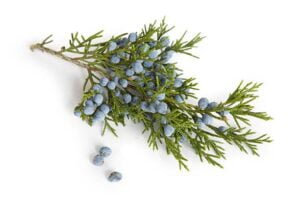 Juniper berries are rich in antioxidants, which play a crucial role in neutralizing harmful free radicals in the body. Free radicals are associated with oxidative stress and aging, and studies suggest that the antioxidants in juniper berries may contribute to cellular protection and reduce the risk of chronic diseases.
Juniper berries are rich in antioxidants, which play a crucial role in neutralizing harmful free radicals in the body. Free radicals are associated with oxidative stress and aging, and studies suggest that the antioxidants in juniper berries may contribute to cellular protection and reduce the risk of chronic diseases.
Furthermore, juniper berries stand out for their unique composition of antioxidants, including flavonoids and polyphenols. These compounds not only provide the berries with their distinctive flavor but also enhance their potential health benefits. The synergistic interplay of these antioxidants in juniper berries may offer a nuanced and comprehensive shield against oxidative damage, reinforcing cellular resilience and promoting overall well-being.
Reference: Pellegrini, N., Serafini, M., Colombi, B., Del Rio, D., Salvatore, S., Bianchi, M., … & Brighenti, F. (2003). Total antioxidant capacity of plant foods, beverages and oils consumed in Italy assessed by three different in vitro assays. The Journal of nutrition, 133(9), 2812-2819.
Anti-Inflammatory Effects
Research indicates that juniper berries may possess anti-inflammatory properties. Compounds found in juniper berries, such as flavonoids and polyphenols, have demonstrated the ability to modulate inflammatory pathways, potentially reducing inflammation and its associated health risks.
The presence of specific terpenes, including alpha-pinene and limonene, further enhances the berries’ anti-inflammatory potential. These terpenes, known for their aromatic qualities, contribute not only to the distinct flavor of juniper berries but also to their ability to intervene in inflammatory processes, offering a holistic and sensorial approach to potential health benefits.
Reference: Ojala, T., Remes, S., Haansuu, P., Haeggström, C. A., Vuorela, H., Hiltunen, R., & Vuorela, P. (2000). Antimicrobial activity of some coumarin containing herbal plants growing in Finland. Journal of ethnopharmacology, 73(1-2), 299-305.
Digestive Support
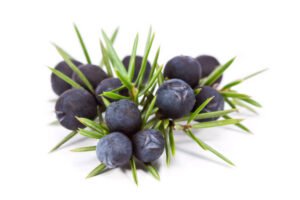 Traditionally, juniper berries have been employed to aid digestion. Essential oils found in juniper berries, such as alpha-pinene, may contribute to the relaxation of the gastrointestinal tract and exhibit antimicrobial effects, potentially supporting digestive health.
Traditionally, juniper berries have been employed to aid digestion. Essential oils found in juniper berries, such as alpha-pinene, may contribute to the relaxation of the gastrointestinal tract and exhibit antimicrobial effects, potentially supporting digestive health.
Moreover, the unique combination of compounds in juniper berries, including terpenes and flavonoids, imparts distinct properties that set them apart in promoting digestive well-being. The presence of these bioactive compounds not only aids in soothing the digestive tract but also encourages a balanced microbial environment, fostering the growth of beneficial gut bacteria.
Reference: Grigoleit, H. G., & Grigoleit, P. (2005). Gastrointestinal clinical pharmacology of peppermint oil. Phytomedicine, 12(8), 607-611.
Diuretic Properties
Juniper berries are recognized for their diuretic effects, promoting increased urine production. This diuretic action may help in eliminating excess fluids and toxins from the body, contributing to the maintenance of healthy kidney function.
Moreover, the diuretic properties of juniper berries are attributed to compounds like terpinen-4-ol and diuretic essential oils, setting them apart from conventional diuretic sources. This unique blend not only aids in fluid balance but also imparts a refreshing quality, making juniper berries a distinctive choice for those seeking a natural diuretic that aligns with holistic well-being. The berries’ nuanced impact on urine production showcases their potential to offer a comprehensive approach to maintaining optimal renal health.
Reference: Blumenthal, M., Goldberg, A., & Brinckmann, J. (Eds.). (2000). Herbal medicine: Expanded Commission E monographs. Integrative Medicine Communications.
Antimicrobial Potential
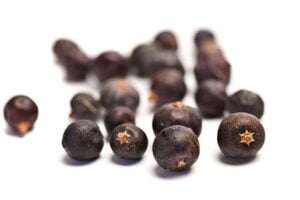 Juniper berries have demonstrated antimicrobial properties, with certain compounds exhibiting inhibitory effects against various pathogens. Research suggests that the essential oils found in juniper berries may have the ability to combat bacteria and fungi, contributing to overall immune system support.
Juniper berries have demonstrated antimicrobial properties, with certain compounds exhibiting inhibitory effects against various pathogens. Research suggests that the essential oils found in juniper berries may have the ability to combat bacteria and fungi, contributing to overall immune system support.
The compounds in juniper berries not only exhibit inhibitory effects against a spectrum of pathogens but also showcase a remarkable selectivity, targeting harmful microorganisms while preserving beneficial bacteria. This specificity highlights the nuanced and sophisticated nature of juniper berries’ antimicrobial properties, making them a fascinating subject of research in the quest for natural alternatives to support immune health.
Reference: Schnitzler, P., Koch, C., Reichling, J. (2007). Susceptibility of drug-resistant clinical herpes simplex virus type 1 strains to essential oils of ginger, thyme, hyssop, and sandalwood. Antimicrobial Agents and Chemotherapy, 51(5), 1859-1862.
Blood Sugar Regulation
Preliminary studies propose that juniper berries may have a role in regulating blood sugar levels. The presence of bioactive compounds, such as polyphenols, may influence glucose metabolism and insulin sensitivity, suggesting a potential benefit for individuals managing diabetes or at risk of developing the condition.
Terpenes, found abundantly in juniper berries, have been associated with improved insulin sensitivity and may play a key role in mitigating insulin resistance, a crucial factor in managing diabetes.
Additionally, the flavonoids present in juniper berries have shown anti-inflammatory properties, potentially aiding in reducing chronic inflammation, which is often linked to insulin resistance and impaired glucose metabolism.
Reference: Etxeberria, U., de la Garza, A. L., Campión, J., Martínez, J. A., & Milagro, F. I. (2012). Antidiabetic effects of natural plant extracts via inhibition of carbohydrate hydrolysis enzymes with emphasis on pancreatic alpha amylase. Expert Opinion on Therapeutic Targets, 16(3), 269-297.
Joint and Muscle Support
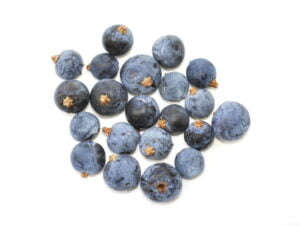 Juniper berries have been traditionally used to alleviate joint pain and muscle discomfort. Some studies indicate that the anti-inflammatory properties of juniper may contribute to reduced pain and improved mobility, making it a potential complementary approach for individuals with arthritis or muscle-related issues.
Juniper berries have been traditionally used to alleviate joint pain and muscle discomfort. Some studies indicate that the anti-inflammatory properties of juniper may contribute to reduced pain and improved mobility, making it a potential complementary approach for individuals with arthritis or muscle-related issues.
Moreover, the unique combination of bioactive compounds found in juniper berries, including terpenes and flavonoids, sets them apart in the realm of natural remedies for joint and muscle support. These compounds not only exhibit anti-inflammatory effects but also display antioxidant properties, potentially aiding in the reduction of oxidative stress within the joints and muscles.
Furthermore, juniper berries, with their distinct profile of essential oils, may offer a dual benefit by promoting relaxation and soothing discomfort associated with muscle tension. This holistic approach to joint and muscle well-being underscores the versatility of juniper berries as a botanical ally in the pursuit of overall physical comfort and flexibility.
Reference: Al-Oudat, M. F. (2002). Chemical composition and anti-inflammatory effect of the oleo-resin from Pistacia lentiscus L. var. chia. Die Pharmazie, 57(1), 63-64.
Respiratory Health
The aromatic compounds present in juniper berries, particularly the essential oils, have been associated with respiratory benefits. Inhalation of juniper vapors is believed to have a soothing effect on the respiratory tract, potentially providing relief from conditions such as coughs and congestion. Some studies suggest that juniper essential oil may possess expectorant properties, aiding in the expulsion of mucus.
Continuing the discussion on respiratory health, the unique properties of juniper berries contribute to their distinctive role in promoting overall respiratory well-being. Notably, the berries are known for their anti-inflammatory attributes, which may help alleviate inflammation in the respiratory passages, providing a potential relief for individuals with respiratory issues.
Furthermore, the presence of compounds such as alpha-pinene in juniper berries is thought to exert a bronchodilator effect, aiding in the dilation of the airways. This property can be especially beneficial for individuals with conditions like asthma, potentially enhancing airflow and easing respiratory discomfort.
Reference: Lis-Balchin, M., & Hart, S. (1997). Studies on the mode of action of the essential oil of lavender (Lavandula angustifolia P. Miller). Phytotherapy Research, 11(4), 301-308.
Mental Well-Being
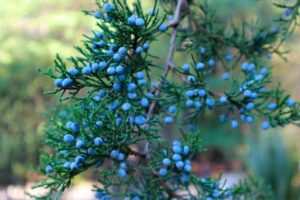 The aroma of juniper berries has been linked to positive effects on mental well-being. Inhalation of the scent may have a calming and mood-enhancing impact, potentially reducing stress and anxiety levels. While more research is needed in this area, the traditional use of juniper in aromatherapy suggests a connection between its fragrance and psychological benefits.
The aroma of juniper berries has been linked to positive effects on mental well-being. Inhalation of the scent may have a calming and mood-enhancing impact, potentially reducing stress and anxiety levels. While more research is needed in this area, the traditional use of juniper in aromatherapy suggests a connection between its fragrance and psychological benefits.
Moreover, the unique terpenes present in juniper berries, such as alpha-pinene and limonene, contribute to its aromatic profile. These compounds have been associated with anti-anxiety and anti-depressant properties in preliminary studies, adding a layer of complexity to the potential mental health benefits offered by the distinct fragrance of juniper berries.
Additionally, the subtle yet invigorating scent of juniper may serve as a sensory anchor, promoting a sense of tranquility and aiding in stress relief, making it a compelling subject for further exploration in the realm of aromatherapy and well-being.
Reference: Sayorwan, W., Siripornpanich, V., Piriyapunyaporn, T., Hongratanaworakit, T., Kotchabhakdi, N., & Ruangrungsi, N. (2013). The effects of lavender oil inhalation on emotional states, autonomic nervous system, and brain electrical activity. Journal of the Medical Association of Thailand, 96(4), 1-9.
Culinary Delight
Beyond their potential health benefits, juniper berries are celebrated for their unique flavor profile, often described as a harmonious blend of citrus, pine, and spice. They are a versatile addition to both sweet and savory dishes, imparting a distinctive taste to marinades, sauces, and desserts. The culinary use of juniper berries adds not only flavor but also a potential nutritional boost to a variety of dishes.
The nutritional values per 100 grams
- Calories: Around 263 calories
- Water: Approximately 43 grams
- Protein: Roughly 2.7 grams
- Fat: About 1 gram
- Saturated Fat: About 0.04 grams
- Monounsaturated Fat: About 0.09 grams
- Polyunsaturated Fat: About 0.2 grams
- Carbohydrates: Around 53 grams
- Dietary Fiber: Approximately 40 grams
- Sugars: About 19 grams
- Vitamins and Minerals:
- Vitamin C: About 21 milligrams
- Vitamin A: About 0 micrograms
- Vitamin K: Approximately 53 micrograms
- Potassium: Around 525 milligrams
- Calcium: Approximately 661 milligrams
- Iron: About 6.7 milligrams
- Magnesium: Around 40 milligrams
- Phosphorus: Approximately 37 milligrams
It’s important to note that these values are general estimates and can vary based on factors such as the specific variety of juniper berries and growing conditions. Additionally, juniper berries are often used in small quantities due to their potent flavor, so actual intake may differ from these values. If precise nutritional information is crucial, it’s recommended to refer to specific food databases or consult with a nutritionist.
Conclusion
Incorporating juniper berries into one’s diet may offer a range of health benefits, supported by scientific evidence. From antioxidant-rich properties to potential anti-inflammatory effects and digestive support, juniper berries stand out as a versatile and flavorful addition to a healthy lifestyle. However, it is essential to consult with a healthcare professional before incorporating significant dietary changes, especially for individuals with pre-existing health conditions or those taking medications.
 Embark on a gastronomic journey with Jamie Oliver’s enticing recipe for Venison Shanks with Juniper and Redcurrants. Renowned for his culinary expertise, Jamie Oliver invites you to savor the rich and robust flavors of venison, complemented by the aromatic essence of juniper and the vibrant burst of redcurrants. This delectable stew recipe promises a symphony of tastes, marrying the earthy, gamey notes of venison with the fragrant and slightly citrusy undertones of juniper. The addition of redcurrants adds a touch of sweetness, creating a harmonious balance that elevates this dish to a culinary masterpiece.
Embark on a gastronomic journey with Jamie Oliver’s enticing recipe for Venison Shanks with Juniper and Redcurrants. Renowned for his culinary expertise, Jamie Oliver invites you to savor the rich and robust flavors of venison, complemented by the aromatic essence of juniper and the vibrant burst of redcurrants. This delectable stew recipe promises a symphony of tastes, marrying the earthy, gamey notes of venison with the fragrant and slightly citrusy undertones of juniper. The addition of redcurrants adds a touch of sweetness, creating a harmonious balance that elevates this dish to a culinary masterpiece.
Contraindications for Consuming Juniper Berries
While juniper berries are generally safe for consumption when used in culinary quantities, it’s important to note that excessive intake or use for medicinal purposes may lead to certain contraindications. Here are some potential contraindications associated with the consumption of juniper berries:
Pregnancy and Breastfeeding:
- Juniper berries are known to stimulate uterine contractions, which may pose a risk during pregnancy. Pregnant women are advised to avoid juniper berries.
- There is limited information on the safety of juniper during breastfeeding, so it’s recommended for nursing mothers to consult with a healthcare professional before consuming juniper berries.
Kidney Issues:
- Juniper berries have diuretic properties, which means they may increase urine production. Individuals with kidney problems should exercise caution as excessive diuresis could potentially worsen their condition.
Gastrointestinal Issues:
- In some cases, juniper berries may cause stomach upset, heartburn, or gastrointestinal irritation. Individuals with sensitive digestive systems or pre-existing gastrointestinal conditions should be cautious.
Allergic Reactions:
- While rare, some individuals may be allergic to juniper berries. Allergic reactions could manifest as skin rashes, itching, or respiratory symptoms. Individuals with known allergies to coniferous plants should avoid juniper berries.
Interactions with Medications:
- Juniper berries may interact with certain medications, including diuretics, lithium, and medications processed by the liver. It’s advisable for individuals on medication to consult with a healthcare professional before incorporating juniper berries into their diet.
Autoimmune Diseases:
- Juniper berries may stimulate the immune system, and individuals with autoimmune diseases should exercise caution, as it could potentially exacerbate autoimmune responses.
It’s crucial for individuals to consult with a healthcare professional before making significant changes to their diet, especially if they have pre-existing health conditions or are taking medications. The information provided here is not exhaustive, and personalized medical advice is essential for safe consumption.
Fascinating Facts About Juniper Berries
- Slow Maturity:
Juniper berries exhibit a slow maturation process, taking up to two to three years to fully ripen. This extended development period contributes to their unique flavor profile and aromatic characteristics.
Used in Beer Brewing:
While often associated with spirits like gin, juniper berries have also found their way into the world of craft beer brewing. Some brewers incorporate juniper berries to add a distinctive twist to their beer recipes, creating brews with intriguing botanical notes.
Natural Pest Repellent:
The essential oils extracted from juniper berries contain compounds that act as natural insect repellents. In some cultures, juniper branches were traditionally used to keep pests at bay, showcasing the plant’s practical applications beyond culinary and medicinal uses.
Symbolism in Literature:
Juniper berries have made their mark in literature as symbols of endurance and transformation. In folklore and literature, they are sometimes associated with characters facing challenges or embarking on transformative journeys.
Historical Brewing Regulations:
In medieval Europe, juniper berries were a common ingredient in brewing before the widespread use of hops. In fact, some regions had brewing regulations specifying the acceptable ratio of juniper berries to malt in beer production.
Natural Air Freshener:
The aromatic qualities of juniper berries make them a natural choice for homemade air fresheners. Boiling juniper berries with other fragrant herbs or citrus peels creates a delightful and refreshing scent, offering a natural alternative to commercial air fresheners.
Traditional Craftsmanship:
Juniper wood, in addition to the berries, has been historically used in traditional craftsmanship. From making small utensils to crafting intricate carvings, juniper wood showcases the plant’s versatility in various artisanal endeavors.
Magical Folklore:
In certain magical folklore, juniper was believed to possess protective qualities. The branches were often hung over doorways to ward off evil spirits, and the berries were sometimes carried as protective amulets.
Unique Pollination Process:
Juniper plants have an interesting pollination process. They are dioecious, meaning that individual plants are either male or female. The male plants release pollen, which is then carried by the wind to fertilize the female plants, ultimately leading to the development of berries.
Historical Brewing in Monasteries:
Juniper berries played a role in medieval monastery brewing practices. Monks, known for their brewing expertise, experimented with various botanicals, including juniper, to create unique and flavorful concoctions.
Time Capsule Qualities:
Juniper berries, due to their resilience and slow maturation, have been found in archaeological sites dating back thousands of years. These ancient berries act as time capsules, preserving a glimpse of the plant’s genetic history.
Anti-Witchcraft Traditions:
In European folklore, juniper was believed to have protective qualities against witches. The branches were often used to create “witching bottles” filled with sharp objects, protecting homes from magical harm.
Mystical Divination Tool:
Some historical accounts mention the use of juniper berries in divination practices. It was believed that the arrangement of berries could reveal insights into the future or provide guidance in decision-making.
Juniper Berry Wine:
In certain regions, particularly in Eastern Europe, juniper berries are used to make traditional wines. These unique wines boast a distinct flavor profile, combining the berry’s essence with the complexities of fermentation.
Winter Survival Food:
In times of scarcity, certain indigenous communities used juniper berries as a survival food during harsh winter months. The berries provided a source of nutrition when other food options were limited.
Traditional Toothache Relief:
Some traditional folk remedies include the use of juniper berries for toothache relief. Chewing on juniper berries or applying a poultice made from crushed berries was believed to alleviate dental discomfort.
Juniper Berry Ink:
The dark purple color of juniper berries has been utilized to make natural ink. Historically, scribes and writers in certain cultures experimented with berry-based inks for creating manuscripts.
Symbol of Protection in Graveyards:
In parts of Scotland, juniper was planted in graveyards as a symbolic protector against malevolent spirits. This practice reflects the longstanding belief in the plant’s ability to ward off negative energies.
Aromatic Wardrobe Freshener:
In the past, juniper berries were used as a natural wardrobe freshener. Placing dried berries in closets and storage areas helped repel moths and added a pleasant aroma to clothing.
Juniper Wood Charms:
Beyond its culinary and aromatic uses, juniper wood was fashioned into charms and talismans in some cultures. These charms were believed to bring good fortune and protection.
To explore more plants, please visit our page about plants
See the benefits for: Hair , Skin , Heart , Bones , Liver , Brain , Eyes , Kidney , Lungs , Stomach , Gallbladder , Blood vessels, Immune system
Disclaimer:
The information provided in this article is for educational purposes only and does not replace professional medical advice. Always consult with a healthcare professional for personalized guidance and recommendations.
